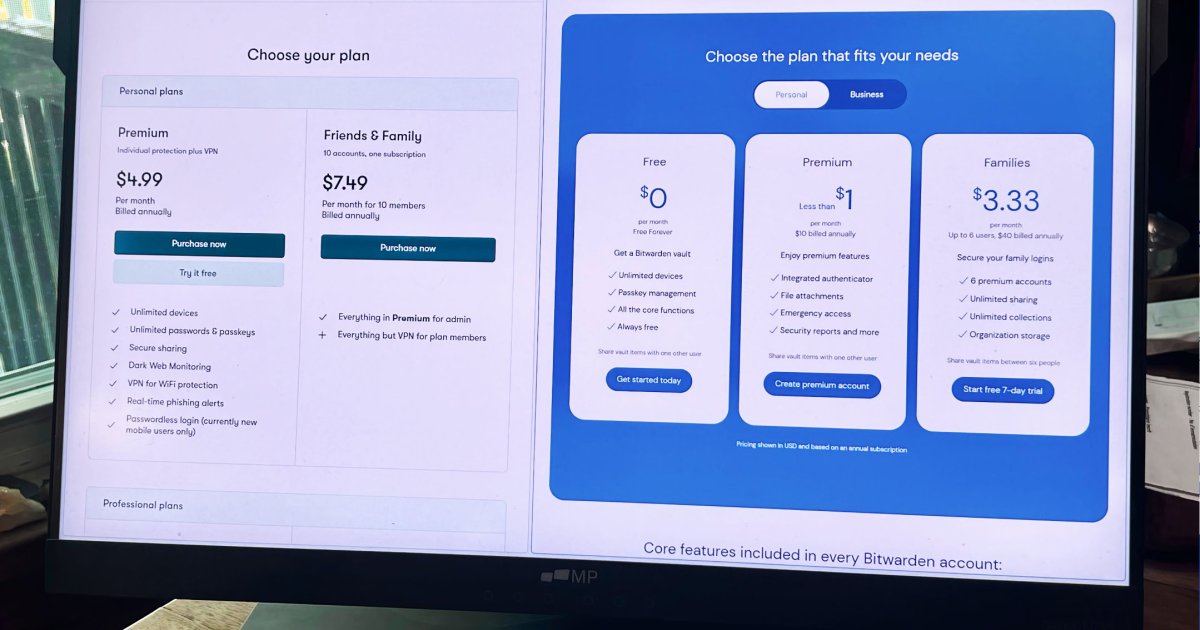

Looking for a new password manager? While there are plenty of solutions to choose from, Dashlane and Bitwarden are among the best. I’ve reviewed both and can help you decide which is the best fit for your particular needs.
Tiers and pricing
A side-by-side comparison of pricing for Dashlane and Bitwarden. Digital Trends
If you want a free password manager, Bitwarden is the clear winner since it offers a full-featured solution with no arbitrary restrictions. Dashlane’s free version is more like an unlimited trial since it’s limited to a maximum of 25 logins.
The real challenge comes when we get to the subscription plans. Both companies require you to purchase a year’s subscription, so the monthly pricing shown on the websites is a marketing ploy. Bitwarden is clearly less expensive, starting at $10 per year for one person, while Dashlane’s cheapest plan for individuals costs $60 annually.
Dashlane’s premium plan costs six times as much as Bitwarden’s, but there’s a reason for the added expense — Dashlane includes more features. I’ll get into the details below.
One of the great things about a password manager is the ability to share logins with others and Dashlane’s $90 Friends and Family plan provides accounts for up to 10 people. While Bitwarden’s Families subscription costs only $40, it supports up to six members.
That works out to $9 per person annually with Dashlane or $6.66 per person for Bitwarden. If you actually need to organize passwords for 10 people, Dashlane costs only a little bit more. However, Bitwarden is much more affordable for smaller groups.
Features
Bitwarden offers more autofill and security options than competitors. Digital Trends
Dashlane offers more premium features, while Bitwarden allows more customization at a lower cost. Password managers are relatively cheap, but with a growing burden of subscriptions, the annual charges begin to add up to a substantial amount.
It’s worth taking a moment to consider what features you really need, rather than blindly picking the more expensive option. For example, Dashlane comes with dark web monitoring and a high-speed VPN that normally costs $8 per month.
The Hotspot Shield VPN included with Dashlane is quite fast. Digital Trends
In my testing of Dashlane, I measured nearly 500 Mbps bandwidth with the VPN on. I have gigabit internet and my computer regularly gets 900 Mbps. While throughput was cut in half, that’s still impressive speed for a VPN that’s bundled for free.
Some of the best antivirus software solutions already include dark web monitoring and a VPN, limiting the appeal of Dashlane’s offer. However, if you need these features, Dashlane’s combined offer of a password manager, dark web checks, and a VPN is enticing.
Bitwarden is open-source software with a large development team working on maintenance and refinements. There are plenty of ways to customize this experience. You can add more encrypted storage to Bitwarden, while Dashlane is fixed at 1 GB. Bitwarden even lets you self-host, so your data never leaves your own server.
On the other hand, Dashlane is more freeing, since you can securely share logins with anyone. Bitwarden’s Free and Premium plans only allow sharing with one other person. Even the Families plan restricts sharing to just five other family members.
Support
Bitwarden’s customer support is by email, but answers can be found in the extensive documentation. Digital Trends
Both services offer premium support for paid subscribers via email. Dashlane claims to offer live chat, but I only got an AI chatbot that proved to be unhelpful. When I requested a human or live agent, my request went to email support.
Dashlane took over a day to respond, while Bitwarden got back to me with a solution within three hours. Turnaround time for support requests always varies, so my experience might not be typical. Both services have good ratings in customer service reviews.
Privacy and security
Dashlane and Bitwarden each use end-to-end AES 256 encryption, the industry standard for security. Even if a hacker gains access to the servers that hold your data, decrypting it would be impractical with current technology. Neither company has been breached.
Your privacy is equally secure with Dashlane and Bitwarden. While legal requests from authorities will be complied with, your personal information won’t be sold or shared to third-parties.
Which password manager is best?
If you’re an IT or cybersecurity professional, Bitwarden’s open source nature might be enough to win you over. In particular, self-hosting provides the ultimate in control of your data.
The price is right also. Bitwarden’s free version might be all you need, since it supports cross-platform with no limit on the number of devices or logins. For individuals that don’t need to share passwords frequently, the $10 annual plan is hard to beat.
That said, Dashlane includes more features and unlimited sharing. If you don’t already have a top-rated VPN service, Dashlane offers better value with its $60 Premium plan.
For most people, Dashlane is worth the extra money. It’s also a great option for large families and groups with up to 10 members.
If neither solution seems like a good fit, there are alternatives. Check out our list of the best password managers to see more great options.
Editors’ Recommendations






